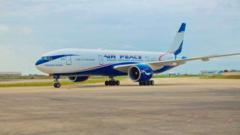Did a Nigerian Pilot's Alcohol Test Contribute to a Runway Incident?

Published: 2025-09-12 16:36:18 | Category: world
A recent incident involving a Boeing 737 at Port Harcourt International Airport has raised concerns over safety protocols in the aviation sector after both the pilot and co-pilot tested positive for alcohol following a runway excursion. While all passengers were unharmed, the incident highlights the need for stringent adherence to safety regulations in aviation.
Last updated: 21 October 2023 (BST)
Key Takeaways
- Both pilot and co-pilot tested positive for recent alcohol consumption.
- A crew member also tested positive for cannabis.
- The pilot has been dismissed, while the co-pilot has been acquitted.
- Investigations by the Nigerian Safety Investigation Bureau (NSIB) are ongoing.
- Air Peace has called for clearer communication on toxicology results from authorities.
The Incident Overview
On a day in July, during a routine landing at Port Harcourt International Airport in Nigeria, a Boeing 737 operated by Air Peace veered off the runway. No injuries were reported among the 103 passengers and crew onboard, but subsequent investigations revealed alarming findings regarding the flight crew's conduct.
Testing and Results
Following the incident, the Nigerian Safety Investigation Bureau (NSIB) conducted a series of toxicology tests on the flight crew. The results indicated that both the pilot, a 64-year-old with over 18,000 hours of flying experience, and the co-pilot, a 28-year-old with nearly 1,200 hours, had tested positive for Ethyl Glucuronide (EtG), a biomarker for recent alcohol consumption. Additionally, a cabin crew member was found to have cannabis (THC) in their system.
Immediate Consequences for the Pilot and Co-Pilot
As a direct consequence of these results, Air Peace terminated the employment of the pilot due to his failure to comply with safety regulations. In contrast, the co-pilot was reinstated after the Nigeria Civil Aviation Authority (NCAA) acquitted him of wrongdoing based on preliminary investigations.
Air Peace’s Response
In an official statement, Air Peace expressed its concern over the lack of communication from the NSIB. The airline stated that it had not received any official toxicology test results from the investigation, despite the tests being conducted shortly after the incident.
“We are yet to receive any official communication from the NSIB on such findings over a month after the incident,” the airline remarked, highlighting the need for improved dialogue between aviation authorities and operators.
Regulatory Oversight and Ongoing Investigations
The NSIB has confirmed that its investigation is still in progress. Preliminary findings suggest a need for enhanced training programmes and stricter adherence to internal safety protocols within airline operations. This incident, while not leading to any casualties, prompts a serious reevaluation of safety culture in Nigerian aviation.
Context: Aviation Safety in Nigeria
Despite not having experienced a major plane crash in several years, Nigeria's aviation sector is not without its challenges. Incidents such as runway excursions and tyre bursts during landings have been noted, raising questions about the effectiveness of current safety measures. These occurrences underline the importance of continuous improvement in flight safety protocols.
Recent Developments in Aviation Safety Technology
In response to safety concerns, Nigerian aviation authorities have recently inaugurated a new flight data centre aimed at enhancing aircraft safety. This initiative is part of a broader effort to ensure that the aviation sector adopts advanced technology and improved safety practices. However, stakeholders insist that more comprehensive measures are necessary to safeguard passengers and crew alike.
What Happens Next?
As investigations by the NSIB continue, the aviation community and the broader public await further updates on the findings and recommendations that may emerge. The potential implications of these investigations could lead to significant changes in policy and operational procedures within Nigerian airlines.
Conclusion
The incident at Port Harcourt International Airport serves as a stark reminder of the paramount importance of safety in aviation. With the pilot dismissed and the co-pilot reinstated, the focus now shifts to regulatory bodies and aviation companies to ensure such lapses do not recur. As the sector evolves, it remains crucial that safety protocols are not only established but strictly enforced to protect all who travel by air.
With ongoing investigations and new safety initiatives, there is hope for improvements in the aviation sector. How will these developments shape the future of air travel in Nigeria? #AviationSafety #NigeriaAirlines #AirPeace
FAQs
What were the results of the toxicology tests conducted on the flight crew?
The toxicology tests revealed that both the pilot and co-pilot tested positive for Ethyl Glucuronide (EtG), indicating recent alcohol consumption, while a cabin crew member tested positive for cannabis (THC).
What actions have been taken against the pilot and co-pilot?
The pilot has been dismissed from his position for failing to adhere to safety regulations, while the co-pilot has been reinstated after being acquitted by the NCAA.
What is the current status of the investigations by the NSIB?
The NSIB has confirmed that its investigations are ongoing, focusing on the circumstances surrounding the incident and recommending improvements in training and safety procedures.
What are the implications of this incident for aviation safety in Nigeria?
This incident highlights the need for stricter adherence to safety regulations and may prompt regulatory changes to enhance aviation safety practices in Nigeria.
How has Air Peace responded to the incident?
Air Peace expressed concern over the lack of communication from the NSIB regarding toxicology test results and emphasised the importance of improved dialogue between the airline and regulatory authorities.


